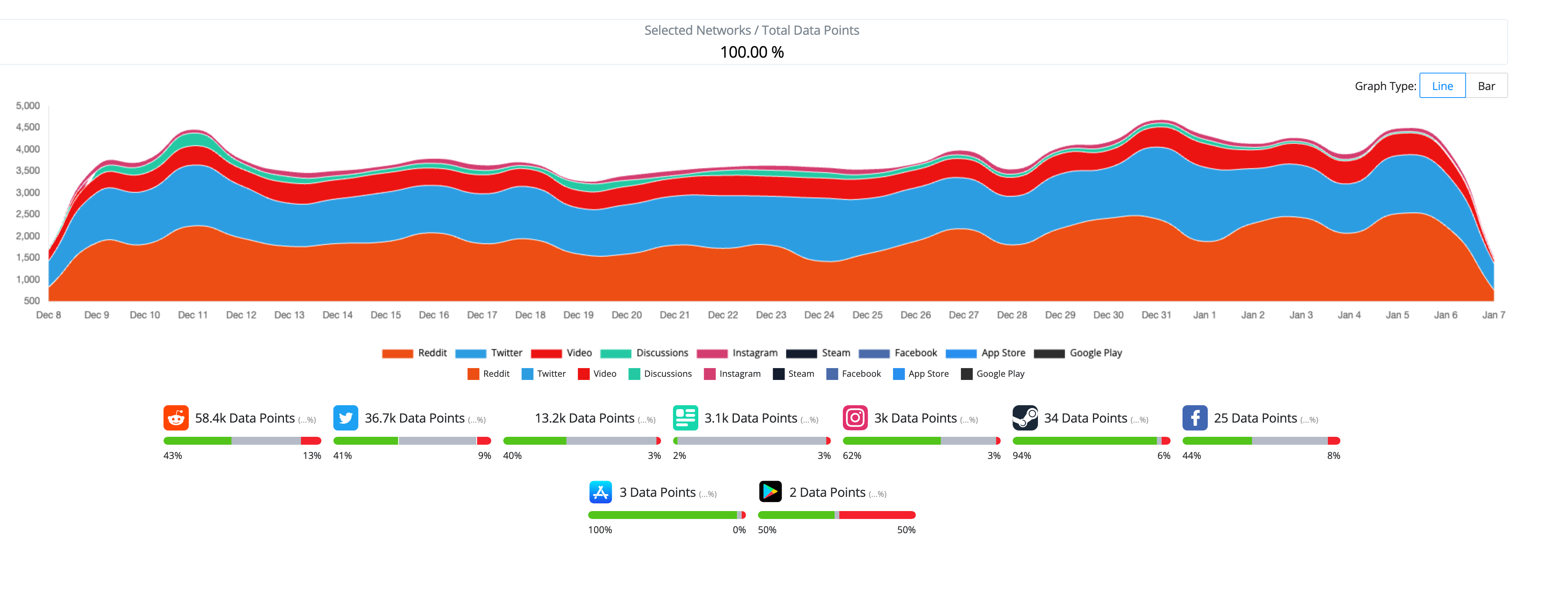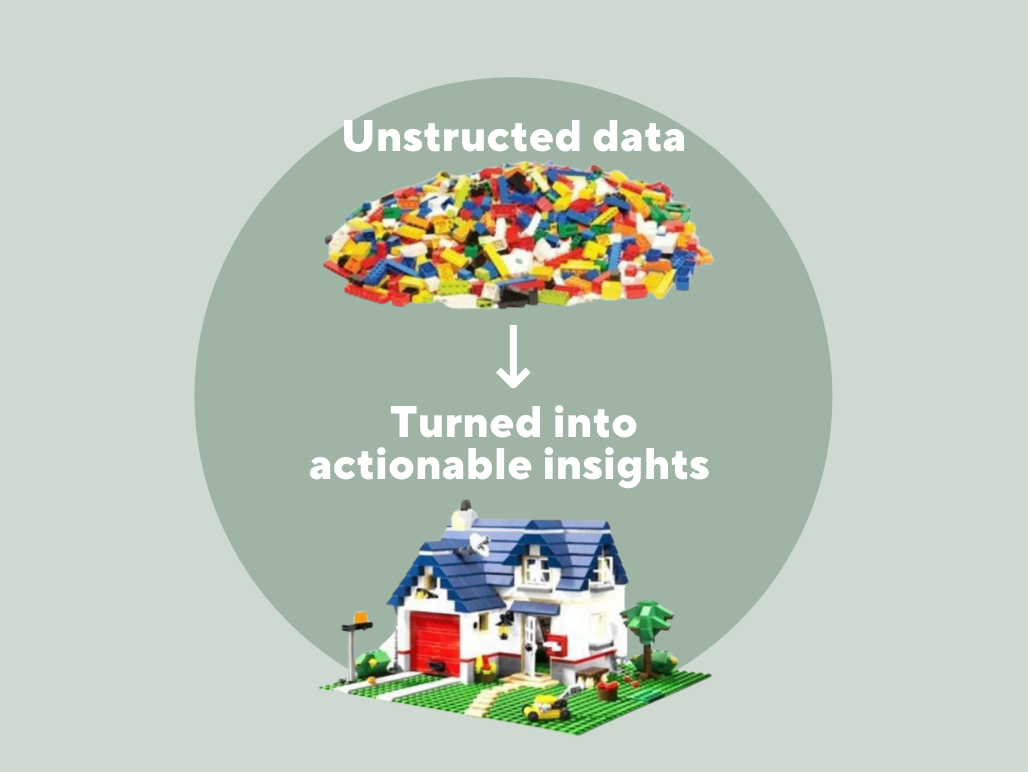The Untapped Goldmine of Unstructured Data
In today’s hyper-connected, data-driven world, businesses are sitting on a treasure trove of insights that remain largely unexplored. According to IDC, a staggering 80% of worldwide data will be unstructured by 2025, presenting a massive opportunity for organizations to harness this raw potential. Yet, many businesses overlook this goldmine, focusing only on structured data—the kind that fits neatly into databases and spreadsheets. By neglecting unstructured data, companies risk missing out on critical insights into customer preferences, behaviors, and sentiments.This blog dives deep into the importance of analyzing unstructured customer data and how businesses can unlock its hidden insights. Moving beyond traditional reviews, we explore techniques, tools, and strategies to leverage unstructured data effectively. From social media posts to Support Interactions, we’ll uncover how analyzing these rich sources of information can drive smarter decision-making, improved customer experiences, and innovative product development.
1. Understanding Unstructured Customer Data
Definition
Unstructured data refers to any information that lacks a predefined format or organizational schema. Unlike structured data—which fits neatly into rows and columns in databases—unstructured data is inherently messy, varied, and complex. It can exist as text, images, videos, or even audio recordings, making it harder to analyze using traditional methods. However, this complexity also makes unstructured data rich with context, emotions, and narratives that structured data often fails to capture.
Types and Examples of Unstructured Data
Unstructured data comes in many forms, reflecting the diverse ways customers express their thoughts and experiences.
Examples include:
- Text Data: Reviews, emails, chat logs, and survey responses.
- Social Media Data: Posts, likes, shares, reactions, comments, and hashtags from platforms like Instagram, Twitter, and Facebook.
- Multimedia Data: Images, videos, and voice recordings containing feedback or product mentions.
- Sensor Data: Inputs from IoT devices, capturing customer behaviors, interactions, and preferences.
- Support Interactions: Customer service transcripts, tickets, and chatbot conversations.

2. The Importance of Analyzing Unstructured Data
Traditional data analysis primarily focuses on structured formats, such as sales metrics and demographic details. While these provide quantitative insights, unstructured data offers richer, qualitative information about customer attitudes and behaviors.
Key Benefits of Analyzing Unstructured Data:
- Improve Customer Experience – Detect pain points and unmet needs, leading to better service and satisfaction. By analyzing customer service logs and chat transcripts, businesses can identify recurring issues. Affogata’s integrations with platforms like Helpshift, a leading in-app support tool, enhance this process by combining ticketing and service interactions with broader feedback analysis. This allows companies to pinpoint friction points more effectively.
- Enhance Product Development – Gather feedback on features, usability, and innovation opportunities. Affogata’s connectivity with diverse support and communication platforms provides game studios and other businesses with a unified view of customer data. This comprehensive approach helps identify areas for improvement and guide new feature development by synthesizing insights from real user interactions.
- Anticipate Trends – Identify emerging trends and shifts in preferences early. By aggregating feedback from a variety of sources, such as community forums, social media, and customer service channels, Affogata offers a unified view of the gaming landscape. This data-driven approach not only highlights current player sentiments but also uncovers subtle changes that may signal future trends.
- Boost Marketing Strategies – Craft targeted campaigns based on sentiment and trends uncovered in feedback. By sifting through a variety of sources—from social media buzz to forum discussions—Affogata uncovers the emotional undercurrents that drive player engagement. This means campaigns can be tailored to address specific desires, frustrations, or anticipations, ensuring that marketing efforts not only hit the mark but also evolve with the shifting tides of player sentiment.

3. Techniques for Unlocking Insights from Unstructured Data
a. Natural Language Processing (NLP)
NLP leverages artificial intelligence to interpret and analyze human language. Its applications include:
- Sentiment Analysis: Detect whether feedback is positive, negative, or neutral.
- Topic Modeling: Identify themes and patterns within large datasets.
- Text Classification: Categorize text into predefined labels, such as complaints, suggestions, or praise.
b. Text Mining
Text mining involves processing vast amounts of textual data to extract patterns and trends:
- Frequent Terms Analysis: Highlight commonly used phrases that signal satisfaction or concerns.
- Clustering and Association Rules: Group similar feedback to pinpoint patterns across segments.
c. Sentiment Analysis
Sentiment analysis measures emotional tones in customer feedback:
- Emotional Context Analysis: Identify sentiments such as joy, frustration, or confusion.
- Problem Detection: Spot subtle dissatisfaction implied through tone or phrasing.
d. Social Listening
Social listening tools analyze customer conversations on social media to uncover real-time insights:
- Trend Monitoring: Track brand sentiment and competitor activity.
- Reputation Management: Assess public perception and respond proactively.
4. Tools and Platforms for Analyzing Unstructured Data
Affogata: A pioneer in the realm of unstructured data and customer sentiment analysis, Affogata provides an advanced platform designed to harness both structured and unstructured data. By mining data from various sources such as reviews, social media, and support tickets, Affogata allows businesses to gain a comprehensive view of their customer base. Whether it’s extracting sentiment from customer feedback or tracking trends across social media platforms, Affogata’s tools empower companies to make data-driven decisions that enhance customer engagement and improve products or services. Its ability to process unstructured data, such as natural language and complex feedback, is particularly crucial in understanding the nuances of customer emotions and sentiments.
5. Real-World Examples of Leveraging Unstructured Data Insights
Scopely: Enhancing Player Engagement through Community Feedback
Scopely, a prominent mobile game developer, has mastered the art of using unstructured data to drive player engagement. By leveraging Affogata’s platform, Scopely monitors and analyzes player feedback for their popular game, MONOPOLY GO!. The company taps into a wealth of unstructured data—captured from player reviews, forums, and social media—to gain real-time insights into player sentiment and preferences. This data-driven approach allows Scopely to craft tailored community strategies, fine-tune game content, and launch new features that resonate with their players. As a result, Scopely not only fosters stronger player loyalty but also maintains a dynamic and engaging gaming experience that continually adapts to their community’s needs.
Fintech Company: Improving Usability
A leading fintech company with more than 8 million subscribers faced a growing tide of complaints related to usability issues across its platform. By utilizing Affogata’s platform, the company collected and analyzed unstructured customer feedback from diverse channels, such as social media posts, support tickets, and app reviews. Through this comprehensive analysis, the company was able to identify and prioritize key product bugs and user experience flaws. Armed with these insights, the fintech company implemented critical updates that led to a 33% improvement in platform usability, significantly boosting customer satisfaction and reducing churn. This case exemplifies how unstructured data analysis can directly influence product development and enhance overall customer experience.
These real-world examples showcase how Affogata’s platform helps companies not just collect feedback but transform unstructured data into actionable insights. From enhancing player engagement to refining usability, the insights gained are invaluable in driving business success and customer satisfaction.
6. Challenges and Considerations
While unstructured data analysis offers immense potential, it’s not without its challenges. Below are key considerations businesses must keep in mind:
Data Privacy: When analyzing customer data—particularly from sensitive sources like social media or support tickets—companies must adhere to privacy regulations such as GDPR. Affogata ensures compliance with GDPR, safeguarding customer data while providing businesses with the insights they need.
Data Quality: Unstructured data is often noisy, inconsistent, and incomplete, which can make it challenging to analyze accurately. To extract meaningful insights, companies must invest in data cleaning and preprocessing techniques to ensure their analysis is based on reliable information.
7. The Future of Unstructured Data Analysis
As AI, machine learning, and NLP technologies continue to evolve, so too will the capabilities of unstructured data analysis. The future promises even more refined and accurate techniques for processing vast amounts of unstructured data in real-time. As these technologies advance, companies will increasingly rely on them to stay ahead of the competition, making data-driven decisions that enhance customer experience. Real-time analytics will become more sophisticated, enabling businesses to not only react swiftly to customer needs but also anticipate future demands. With AI’s ever-expanding role, the potential for unstructured data to shape business strategies is limitless, paving the way for highly personalized and seamless customer interactions.
FAQ: Unstructured Data Analysis and Affogata
- What is unstructured data, and why is it important for businesses? Unstructured data refers to information that doesn’t fit neatly into traditional rows and columns, such as social media posts, customer reviews, or support tickets. This type of data contains valuable insights into customer sentiment, preferences, and pain points. Analyzing unstructured data helps businesses understand their customers better, allowing them to improve products, services, and engagement strategies.
- How does Affogata help businesses analyze unstructured data? Affogata uses advanced techniques and proprietary models to analyze unstructured data from multiple sources, including reviews, social media, and support tickets. By leveraging sentiment analysis, AI, and natural language processing, it transforms raw data into actionable insights, helping companies improve customer satisfaction, monitor brand health, and optimize their products or services.
- Can Affogata ensure compliance with data privacy regulations like GDPR? Yes, Affogata is fully compliant with GDPR and other data privacy regulations. It takes robust measures to protect sensitive customer data while ensuring that businesses can still extract meaningful insights for decision-making.
- What types of businesses can benefit from unstructured data analysis? Any business that interacts with customers, whether through reviews, social media, or support channels, can benefit from analyzing unstructured data. This includes industries such as gaming, fintech, retail, hospitality, and tech. By understanding customer sentiment and feedback, businesses can enhance customer experience and make data-driven decisions.
- What are some challenges associated with analyzing unstructured data? Analyzing unstructured data comes with challenges such as data quality (noisy or incomplete data), complexity (requiring advanced technologies like NLP), and privacy concerns. However, platforms like Affogata help mitigate these challenges by offering tools that clean, process, and analyze unstructured data, ensuring accurate insights while maintaining compliance with privacy laws.
Uncover the insights hidden in your unstructured data👉Book a demo today





